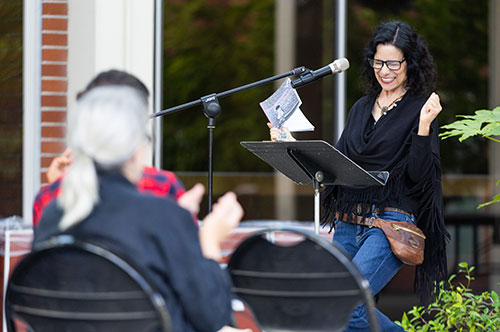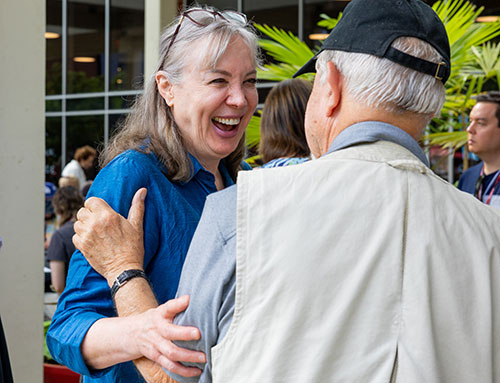Grand Conversations: Pacific's MFA In Writing Celebrates 20 Years
 Pacific University's Master of Fine Arts in Writing program was just over a year old when Shelley Washburn became its first full-time director.
Pacific University's Master of Fine Arts in Writing program was just over a year old when Shelley Washburn became its first full-time director.
And even in its infancy, she saw that the foundation was already in place for what would become a renowned graduate program for writers.
“In the program’s second year, Atlantic Monthly (now known as The Atlantic) wrote an article naming Pacific’s program one of the top five in the nation,” Washburn said. “Later, Poets & Writers named us one of the top three in the nation. Within those first five years, we were getting more student applications than we could handle.”
Twenty years after John Hayes, the former dean of the College of Arts & Sciences, developed the program and supported it through its early years, that first-class reputation continues to endure. Past and present faculty, along with current students and over 50 alumni, came together to mark the MFA’s 20th anniversary at a special reception on June 27. The bash was one of the concluding events of the program’s annual summer residency on Pacific’s Forest Grove campus.
Many of those alums lined up for a moment with Washburn, who directed the MFA program from 2005 to 2020. “It’s really been like a family reunion,” she said between conversations with grateful students.
The low-residency program continues to rank among the best in the country, which welcomes students with life experience who want to take a more serious approach to their writing. Thirty-four students received degrees at the program’s commencement ceremony on June 28.
“Many [students] see it as a way to fulfill a dream,” said Scott Korb, who succeeded Washburn as program director. “There is a risk in becoming a writer, taking something as seriously as we ask them to. They see our programs, and the community we have built over 20 years, as a welcoming opportunity to take that risk.”
The two-year degree is built around concentrated one-on-one work with the university’s acclaimed faculty authors with concentrations in fiction, non-fiction and poetry. The guided study approach asks students to devote 20-25 hours per week to their craft, including readings, commentaries and a major emphasis on developing their own writing. Students can expect five to six exchanges with faculty mentors each semester.
That work includes writing 10 to 15 poems or 20 to 30 pages of prose each semester. Kwame Dawes, a longtime professor in the Pacific program, says that the volume required by the program provides more value for students.
“A normal collection of poetry is 60 poems,” said Dawes, who was recently named the Poet Laureate of Jamaica. “Our students are doing this four times before they graduate. By the time they’re done, they have already written between 100 and 120 poems. The program is organized to help you find ways to do that. And frankly, this is gold.”
 The second major component of the program is a pair of annual residencies where students are exposed to a variety of craft talks and workshops, along with the opportunity to work in person with faculty. The residencies are held in Seaside each January and in Forest Grove each June.
The second major component of the program is a pair of annual residencies where students are exposed to a variety of craft talks and workshops, along with the opportunity to work in person with faculty. The residencies are held in Seaside each January and in Forest Grove each June.
Washburn and Korb agree that the high caliber of Pacific’s faculty members, which includes many national and international award winners, continues to draw students to the program.
“We hire the most interesting, dedicated faculty members that you can imagine,” Washburn said. “They are not only great teachers, they are great writers. They have been honored with prestigious awards such as Lannan Literary Awards, Guggenheims and Pushcart Prizes. On top of all of this, they are smart, soulful and kind.”
Korb adds that the community that the Pacific MFA program has built keeps longtime faculty engaged and attracts new faculty members. “The community itself feeds them,” he said. “There is a mentorship that happens across the faculty as well. Shelley Washburn developed the concept of a grand conversation that students get to have, and it happens as much among faculty as it does between faculty and students.”
That community extends well beyond the classroom. A dedicated corps of alumni, led by the MFA Alumni Council and Friends of the MFA Program, regularly engages with students to provide mentorship and inspiration. They are also taking the lead in funding several endowed scholarships designed to make the program more accessible to writers of all backgrounds.
Louis Whitford MFA ’16, a member of Friends of the MFA, celebrated the generosity of the program’s alumni at the anniversary celebration. “We learned that this wasn’t just a small group of us that gave shout-out compliments. It is the love for this program that is felt year after year by graduates,” he said. “It has flourished and nurtured by a love for this program and its power to change lives. And we’re not done.”
The building blocks for the next 20 years of the MFA program are already in place. An intentional commitment to diversity, equity, inclusion, and accessibility has resulted in not only a more diverse faculty but a more diverse student body. The Body Chronicles program explores medical narratives and the intersection between the MFA program and the College of Health Professions.
But the most important mark of growth in the next 20 years, Korb said, comes from the program alumni who are not only being published but attaching Pacific University’s name in their biographies.
“I see paths for publication and, more importantly, paths towards literary citizenship,” Korb said. “I see a subterranean network of writers who continue stay in touch and workshop each other’s work. The number of books, teaching positions and lectures that our alumni are doing keeps increasing. It is hard to keep up with the number of publications our alumni tell us about.”


